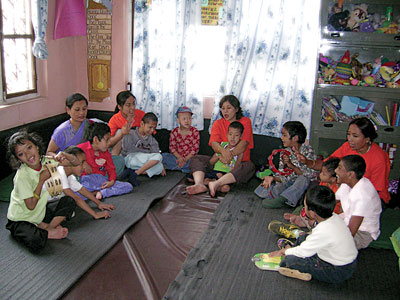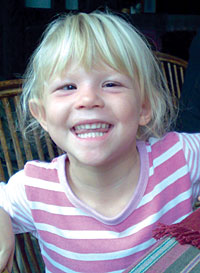 AGE NEPAL |
Finding out your baby has a disability is always going to be heart-breaking. But when you live in a culture where many believe that being born disabled is a direct result of misdeeds in a previous life, the outlook can be overwhelmingly depressing. This is the case for parents of children with Cerebral Palsy (CP) in Nepal.
About one in 400 children are affected by CP in the United Kingdom, and this figure may be higher in Nepal, where there is less pre-natal care. CP is caused by brain damage prior to birth. Children with CP have problems with movement and balance, struggle to speak clearly, and may have problems swallowing and difficulties with spatial perception.
Although some children with CP have learning difficulties, many may have average or above average intelligence. And whilst there is no cure for CP, it is not a condition that gets worse over time, so with early intervention (primarily physiotherapy), the outlook can be quite positive.
In Nepal, however, there is a paucity of support for children with CP, partly due to lack of resources as well as the stigma attached to having a child with CP. Outreach workers report that children with the condition are often locked away from the prying eyes of judgmental neighbours, and relatives will deny there is a disabled child in the family. It's a situation that has been aptly described as Nepal's 'hidden catastrophe' by the Self Help Group for Cerebral Palsy Nepal.
But there are glimmers of hope in the form of determined charities working tirelessly to improve the situation of Nepali children with CP. One of these is A Genuine Effort (AGE) Nepal, based in Kupondole in Lalitpur.
AGE was founded six years ago by three young physiotherapists�- Jeena Shrestha, Arati Singh and Bimala Shrestha�- with the aim of improving quality of life for children with neurological disabilities.
The day care centre, which employs six full-time staff, a part-time accountant and a volunteer occupational therapist from Switzerland, caters for the needs of 17 children between the ages of 3 and 12. AGE offers multi-disciplinary care, including physiotherapy, occupational therapy, play therapy and informal education. The idea is that through sustained stimulation and support these children can enjoy some of the things that 'normal' children take for granted, like sitting up, playing with a musical toy, feeding themselves, or learning to read.
The charity also offers support to parents by providing care and counselling. An additional goal is to educate the broader community about neurological disabilities.
"Here, society blames you for having a disabled child, so we want to help the parents and change the way our community views disabled children," says Bimala.
Jeena, Arati and Bimala would love to do more, but as AGE Nepal runs entirely on private donations, it is very difficult to expand or plan ahead.� "Just a small contribution can make a big difference in the lives of these children," says Arati Singh. "Let us join hands to take these children out of their misery and give them a dignified life."
AGE Nepal: www.agenepal.org.np
Self Help Group for Cerebral Palsy Nepal: http://cpnepal.org
Rose & Babu
 |
I have three children. My youngest, Rose (pic), is now four. She has cerebral palsy, diagnosed at the age of two when we realised she wasn't hitting her developmental markers (she still wasn't walking at the age of two and a half). As soon as we realised there was a real problem, we were offered physiotherapy, speech therapy, play therapy, and put in touch with a welfare advisor to help us access state benefits. As a result, her prognosis is very good: she can now walk, talk and feed herself�- feats that seemed impossible just two years ago�- and has started at the British School in Kathmandu.
What struck me when I arrived in Nepal from the UK a year ago was how incredibly lucky Rose was to have been born in the developed world, with all the financial, medical and cultural benefits that entail for the disabled. There is very little available for Nepali families in this situation.
Seven-year-old Babu Shrestha lives with his family in a one-room rented apartment in Kathmandu. His father is a bus driver and his mother a housewife. He has athetiod cerebral palsy, which causes lots of involuntary movements. This makes his voluntary movements jerky and uncoordinated, causing difficulties with feeding, dressing and using the toilet.
When he is at home, Babu needs round-the-clock care. This is tough on his mother, who has a one-year-old baby to look after as well. She freely admits that she only chose to have another baby because of the stigma attached to having a disabled child in Nepal. She felt she had to have a 'normal' child just to prove that there was nothing wrong with her.
Babu is an extremely sociable child. He loves the company of his friends and family, and adores his baby brother. He has been coming to AGE for the past five years for physiotherapy, speech therapy, occupational therapy and informal education. His condition is such that physically there will probably be little progress. However, during his time at AGE he has learned to respond, speak a few words, and let his care-givers know when he needs to use the toilet. Whilst these may not seem like much, they are huge achievements for a child who faces so many physical challenges.


